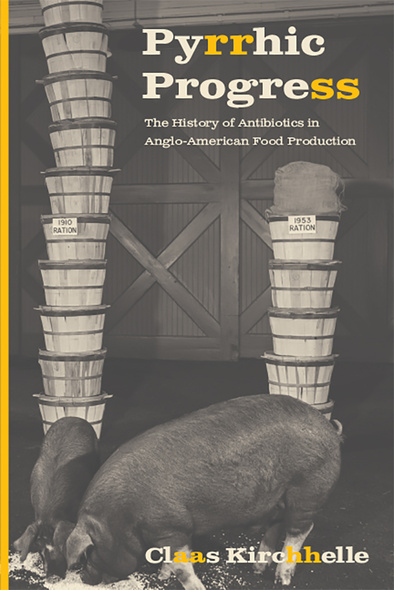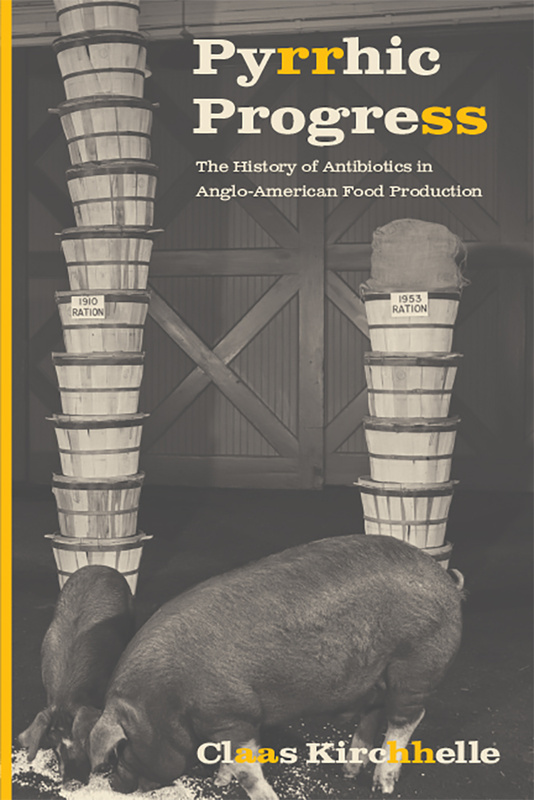
450 pages, 6 x 9
4 color, 18 BW illustrations
Paperback
Release Date:17 Jan 2020
ISBN:9780813591476
Hardcover
Release Date:17 Jan 2020
ISBN:9780813591483
Pyrrhic Progress
The History of Antibiotics in Anglo-American Food Production
Rutgers University Press
Winner of the 2021 Joan Thirsk Memorial Prize from the British Agricultural History Society
2020 Choice Outstanding Academic Title
Winner of the 2020 Turriano Prize from ICOHTEC
Short-listed and highly commended for the Antibiotic Guardian Award from Public Health England
Long-listed for the Michel Déon Prize from the Royal Irish Academy
Pyrrhic Progress analyses over half a century of antibiotic use, regulation, and resistance in US and British food production. Mass-introduced after 1945, antibiotics helped revolutionize post-war agriculture. Food producers used antibiotics to prevent and treat disease, protect plants, preserve food, and promote animals’ growth. Many soon became dependent on routine antibiotic use to sustain and increase production. The resulting growth of antibiotic infrastructures came at a price. Critics blamed antibiotics for leaving dangerous residues in food, enabling bad animal welfare, and selecting for antimicrobial resistance (AMR) in bacteria, which could no longer be treated with antibiotics. Pyrrhic Progress reconstructs the complicated negotiations that accompanied this process of risk prioritization between consumers, farmers, and regulators on both sides of the Atlantic. Unsurprisingly, solutions differed: while Europeans implemented precautionary antibiotic restrictions to curb AMR, consumer concerns and cost-benefit assessments made US regulators focus on curbing drug residues in food. The result was a growing divergence of antibiotic stewardship and a rise of AMR. Kirchhelle’s comprehensive analysis of evolving non-human antibiotic use and the historical complexities of antibiotic stewardship provides important insights for current debates on the global burden of AMR. This Open Access ebook is available under a CC-BY-NC-ND license, and is supported by a generous grant from Wellcome Trust.
2020 Choice Outstanding Academic Title
Winner of the 2020 Turriano Prize from ICOHTEC
Short-listed and highly commended for the Antibiotic Guardian Award from Public Health England
Long-listed for the Michel Déon Prize from the Royal Irish Academy
Pyrrhic Progress analyses over half a century of antibiotic use, regulation, and resistance in US and British food production. Mass-introduced after 1945, antibiotics helped revolutionize post-war agriculture. Food producers used antibiotics to prevent and treat disease, protect plants, preserve food, and promote animals’ growth. Many soon became dependent on routine antibiotic use to sustain and increase production. The resulting growth of antibiotic infrastructures came at a price. Critics blamed antibiotics for leaving dangerous residues in food, enabling bad animal welfare, and selecting for antimicrobial resistance (AMR) in bacteria, which could no longer be treated with antibiotics. Pyrrhic Progress reconstructs the complicated negotiations that accompanied this process of risk prioritization between consumers, farmers, and regulators on both sides of the Atlantic. Unsurprisingly, solutions differed: while Europeans implemented precautionary antibiotic restrictions to curb AMR, consumer concerns and cost-benefit assessments made US regulators focus on curbing drug residues in food. The result was a growing divergence of antibiotic stewardship and a rise of AMR. Kirchhelle’s comprehensive analysis of evolving non-human antibiotic use and the historical complexities of antibiotic stewardship provides important insights for current debates on the global burden of AMR. This Open Access ebook is available under a CC-BY-NC-ND license, and is supported by a generous grant from Wellcome Trust.
This is a great book! Essential reading for anyone concerned about the rise in antibiotics and resistance: Kirchhelle’s carefully researched text reveals the back-stories of antibiotics and farming.
Kirchhelle reveals both the local contexts and the global consequences of the historical relationship between antibiotics and food production. Beautifully written and exhaustively researched, this is a crucial work for understanding how we evaluate and react to 'risks' more broadly.'
Pyrrhic Progress is an excellent work of scholarship that makes important, path-breaking contributions to the history of agriculture, pharmaceuticals, politics, and policymaking in the United States and Britain in the post-World War II era. The connection between guarding against and preparing for antimicrobial resistance and climate change is fantastic, and no other work has examined these important issues as exhaustively.
Antibiotics fueled a great leap forward in food production in the twentieth century, but the price of that progress in terms of potential drug resistant infections was known from the start. This timely historical analysis shows us why previous warnings went unheeded and, in the current climate of concern over a post-antibiotic future, how a history of public discourse can provide salient lessons for one this century’s most pressing issues.
A thorough, critical review of the use of antimicrobials in the US and British agricultural industries since the turn of the 20th century, examining the effects on production volume and quality from the perspective of three spheres of interest: agricultural. regulatory, and public....Highly recommended.
Provides a much-needed and painstakingly researched history of the nonhuman use of antibiotics in live‐ stock production and the professional turf wars and policy debates that have followed their use in farming since the 1940s....Pyrrhic Progress adds to a growing literature on the chemical revolution that has trans‐ formed modern agriculture and the environment more broadly. It adds to a vibrant literature on animal studies which is bringing down conceptual walls that falsely divide the history of humans from that of other animals.
This is an impressive, well-researched, and crucial contribution to the histories of science, technology, medicine, agriculture and policymaking. In the context of our current moment, it helps illuminate the importance and cultural specificity of risk communication work in the wake of both accelerated and slow building health crises.
Provides crucial insight into the historical complexity of risk regimes and their consequences with regard to antibiotic use in livestock farming.
With Pyrrhic Progress, Kirchhelle is delivering on its promise to provide the first detailed, and often thrilling, historiographical analysis of the use of antibiotics in animal health. If we may be surprised at the choice of leaving aside international organizations - the three 'sisters' that are the WHO (World Health Organization), the FAO and the OIE (Word organization for animal health) having played an important role - this absence ultimately opens up new horizons for social scientists interested in veterinary antibiotics and AMR. For them, as for those involved in the field more generally, this book promises to become an essential reference.
The meticulous work done by Kirchhelle is certainly commendable: the book stimulates the reader imagination for developing further stories and historical investigations of farmed antibiotics that would be more-than-Western, more-than-elitist and more-than-human.
Detailed, ambitious, and enormously capable of explaining the economic, political, industrial, and agricultural cultures relevant to the use of antibiotics in the production of animals for human consumption. Kirchhelle's book is very useful [and] a very interesting contribution on the trajectory of consumer society.
Kirchhelle’s study achieves a considerable and important feat, adding an innovative comprehensive framework, which integrates the production and perception of risks across human and animal medicine as well as across two key countries, to the historiography of antibiotics, technological consequences, and risks.
CLAAS KIRCHHELLE (DPhil, Oxon) is a historian at the University of Oxford in the UK. His award-winning research explores the history of antibiotics and the development of modern risk perceptions, microbial surveillance, and international drug regulation.
List of Abbreviations
1. The Sound of Coughing Pigs
Part I. USA: From Industrialized Agriculture to Manufactured Hazards, 1949-1967
2. Picking One's Poisons: Antibiotics and the Public
3. Chemical Cornucopia: Antibiotics on the Farm
4. Toxic Priorities: ANtibiotics and the FDA
Part II. Britain: From Rationing to Gluttony, 1945-1969
5. Fusing Concerns: Antibiotics and the British Public
6. Bigger, Better, Faster: Antibiotics and British Farming
7. Typing Resistence: Antibiotic Regulation in Britain
Part III. USA: The Problem of Plenty, 1967-2013
8. Marketplace Environmentalism: Antibiotics, Public Concerns, and Consumer Solutions
9. Light-Green Reform: Antibiotic Change on American Farms
10. Statutory Defeat: Voluntarism and the Limits of FDA Power
Part IV Britain: From Gluttony to Fear, 1970-2018
11. Between Swann Patriotism and BSE: Antibiotics in the Public Sphere
12. Persistent Infrastructures: Antibiotic Reform and British Farming
13. Swann Song: British Antibiotic Policy After 1969
Conclusion
Acknowledgments
Notes
Bibliography
Index
1. The Sound of Coughing Pigs
Part I. USA: From Industrialized Agriculture to Manufactured Hazards, 1949-1967
2. Picking One's Poisons: Antibiotics and the Public
3. Chemical Cornucopia: Antibiotics on the Farm
4. Toxic Priorities: ANtibiotics and the FDA
Part II. Britain: From Rationing to Gluttony, 1945-1969
5. Fusing Concerns: Antibiotics and the British Public
6. Bigger, Better, Faster: Antibiotics and British Farming
7. Typing Resistence: Antibiotic Regulation in Britain
Part III. USA: The Problem of Plenty, 1967-2013
8. Marketplace Environmentalism: Antibiotics, Public Concerns, and Consumer Solutions
9. Light-Green Reform: Antibiotic Change on American Farms
10. Statutory Defeat: Voluntarism and the Limits of FDA Power
Part IV Britain: From Gluttony to Fear, 1970-2018
11. Between Swann Patriotism and BSE: Antibiotics in the Public Sphere
12. Persistent Infrastructures: Antibiotic Reform and British Farming
13. Swann Song: British Antibiotic Policy After 1969
Conclusion
Acknowledgments
Notes
Bibliography
Index






